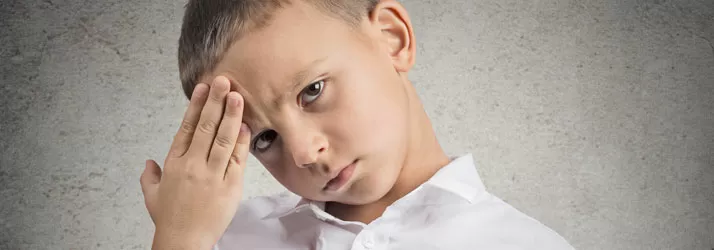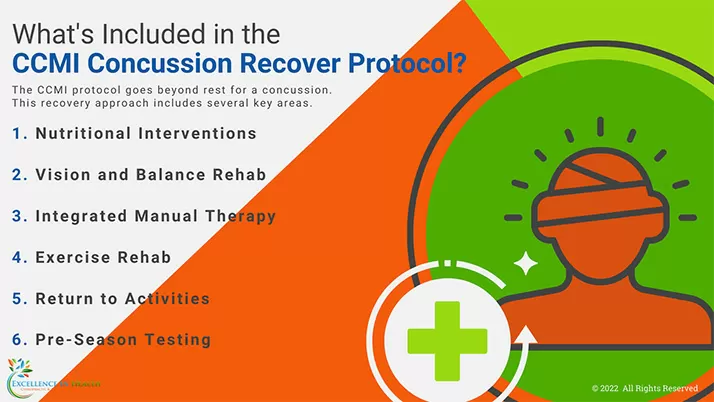Using the CCMI Concussion Recovery Protocol for Effective Concussion Healing.
How Can You Fully Recover From a Concussion? The CCMI Treatment Protocol

Excellence in Health is a proud participant in the Complete Concussion Management Inc. (CCMI) partnership program. In recent years, the "rules" for concussion recovery have changed. Rather than rest and relaxation for a couple of days before returning to one's everyday activities, concussion recovery protocols now call for a step-by-step, phased approach to returning to athletics, work, or school.
Learning about safe concussion recovery is vital to ensuring your athletes lasting physical and post-concussion health. Contact Excellence In Health for more information about using concussion recovery protocols to achieve full recovery.
An Overview of Concussion Diagnosis and Treatment
A concussion is a specific type of traumatic brain injury (TBI) that can occur after a blow to the head, fall, whiplash, or another type of head injury. Depending on the severity of the concussion, symptoms of a concussion may include headache, loss of consciousness, dizziness, problems with balance, neck pain, nausea, vomiting, and others.
If you suspect that you or your child has experienced a concussion, it is crucial to seek medical advice and, if necessary, allow your brain the time it needs to heal adequately. Immediately returning to activity after experiencing concussion symptoms can lead to worsening symptoms and the potential for long-lasting effects, including recurring brain bleeding, swelling, and even death.
What Are Common Concussion Symptoms?
Each concussion is different. However, several common symptoms occur that are divided across four categories, including physical symptoms, emotional symptoms, sleep disturbances, and cognitive or thinking symptoms. If you or your child experience one or more of these symptoms (from any category) following a forcible hit to your head or body, you should suspect a concussion.
Physical Symptoms
Physical symptoms that often accompany a concussion include neck pain, sensitivity to light and sound, headache, dizziness, problems with balance, visual disturbances, nausea, and vomiting.
Emotional Symptoms
Examples of common emotional symptoms that often occur with a concussion include nervousness, irritability, sadness, anxiety, depression, and an overall general increase in emotional response.
Sleep Disturbances
Sleep disturbances are factors related to concussion symptoms that affect your sleep or result from problems with sleep. For example, fatigue, difficulty falling asleep, sleeping more often than usual, fatigue, and sleeping less often.
Cognitive or thinking symptoms
These are symptoms that affect your thoughts and cognitive processes. Common examples include confusion, problems with concentration, memory loss, feeling "in a fog," and trouble thinking clearly.
What Are the Components of the Concussion Recovery Protocol?

Historically, rest was considered the primary approach to concussion care. However, this is no longer the only approach to concussion management. Today, medical professionals point out that early intervention with various therapies can dramatically improve recovery following a concussion. Using thorough assessment techniques and the proper treatment approach for your concussion severity and symptoms, trained health care providers like our team at Excellence in Health can help you safely return to learning, working, and playing.
Limited physical activity and cognitive rest are still recommended within the first 24 to 48 hours following an injury. As noted above, however, research suggests that return to activity decisions can sometimes begin within 48 hours and should be made on a case-by-case basis. Following a short rest period, providers now recommend a gradual increase in mental and physical activity supported by the support and guidance of a licensed professional trained in concussion management and recovery.
It is essential to take your concussion symptoms seriously and follow your doctor's orders. Over 30% of concussions progress to become persistent and chronic health conditions known as Post-Concussion Syndrome or PCS. The concussion recovery protocol followed by our team at Excellence In Health focuses on several key areas.
Nutritional Interventions
Avoiding inflammatory foods and replacing them with more nutritious foods (e.g., whole foods, fruits, and vegetables) may help to reduce inflammation and improve symptoms.
Vision and Balance Rehab
Visual disturbances and dizziness are common following a concussion. A rehabilitation program focused on these areas may help to reduce symptoms related to vision and balance.
Integrated Manual Therapy
Headaches, dizziness, balance, visual issues, and blood flow abnormalities are concussion and neck injuries (or whiplash) symptoms. Often, ongoing symptoms come from your neck, which doctors can treat with manual therapy.
Exercise Rehab
Following a short rest period and period of symptom-limited activity, guided exercise therapy has been shown to improve blood flow and speed recovery.
Return to School, Work & Sport
As you progress through concussion recovery, trained providers will continue to assess and reassess your recovery progress. Under a doctor's supervision and support, you can slowly integrate back into school, work, and athletic pursuits.
Pre-season Testing
Another critical component of concussion recovery is understanding your overall health before the injury occurred. This is referred to as baseline testing. Baseline concussion testing occurs in many schools and athletic groups nationwide. The idea behind baseline concussion testing is to understand your level of functioning going into the athletic season.
Should an injury occur, coaches and medical providers can compare your baseline results to your symptoms and your state of health after the injury to determine the severity of your concussion. Comparing baseline testing from year to year can also help health care providers understand if there are any lingering, long-term health concerns.
Basic Return to Activity Protocol
If you or a loved one experience an injury during a sporting event, it is vital that you do not return to play on the same day as your concussion. Doing so can only further your injury and potentially lead to worsening physical health symptoms. You may only return to active, athletic competition after you have been assessed and cleared by your medical provider or a licensed health care provider trained in concussion assessment and management. Depending on the severity of your concussion, you may need to take some time off from school, work, and sports to allow your brain and body time to heal.
Returning to learning and returning to play are step-by-step rehabilitation strategies. Concussion symptoms that affect your memory can dramatically impact your performance at school. Return to learn protocols help you gradually return to cognitive activities and learning without putting excessive pressure on the injured brain.
Similarly, return to play often includes a series of follow-up assessments to determine the stage of your physical and cognitive recovery. A safe return to play protocol should enforce the gradual introduction of sport-specific activities at various stages throughout the recovery process. It is important to remember that return-to-play concussion recovery protocols may differ for each person, depending on their gender, age, and sport.
Partner with Excellence in Health for Your Concussion Recovery Journey
Concussions are, unfortunately, a common outcome of certain sporting event injuries. Although difficult, taking time away from sporting events and other strenuous activities is important to allow your body and brain the time it needs to heal appropriately.
It is also crucial to work with a professional, highly skilled team of concussion treatment professionals to ensure your recovery progresses appropriately. At Excellence in Health, we provide services for concussion treatment and rehabilitation and pre-season baseline testing for active athletes.
We are thoroughly trained to manage concussions of all severities and are here to help you safely return to the work and athletic activities you enjoy. To learn more about concussion recovery protocols and how you can get back in the game, contact us at Excellence in Health today.

Monday
8:30am - 6:30pm
Tuesday
8:30am - 6:30pm
Wednesday
8:30am - 6:30pm
Thursday
8:30am - 6:30pm
Friday
8:30am - 6:30pm
Saturday
9:00am - 5:00pm
Sunday
Closed
Monday
9:00am - 7:00pm
Tuesday
9:00am - 7:00pm
Wednesday
9:00am - 7:00pm
Thursday
9:00am - 7:00pm
Friday
9:00am - 7:00pm
Saturday
9:00am - 5:00pm
Sunday
Closed
Excellence In Health Chiropractic & Rehabilitation Clinic
2008 E Northern Lights Blvd #100
Anchorage, AK 99508

